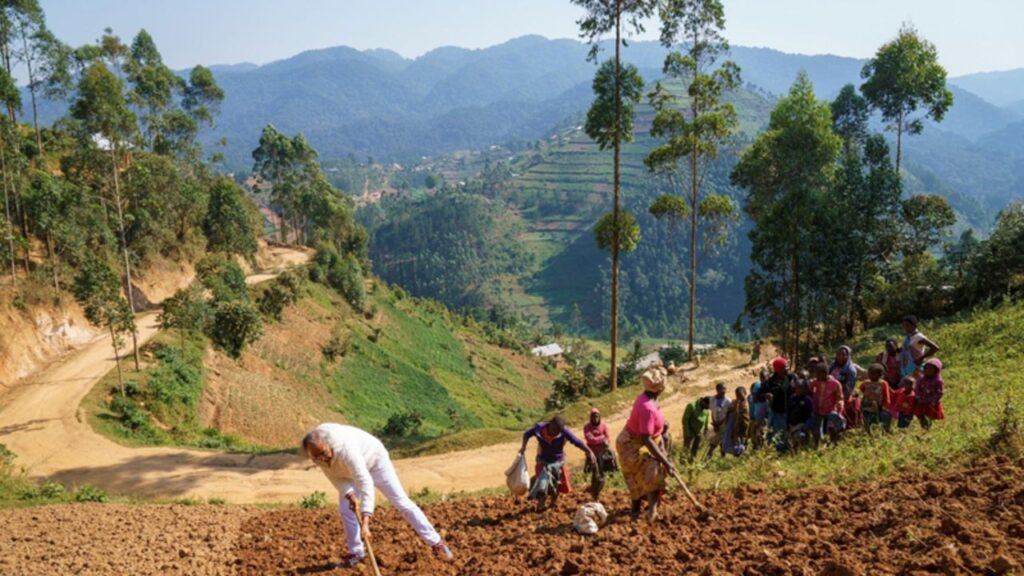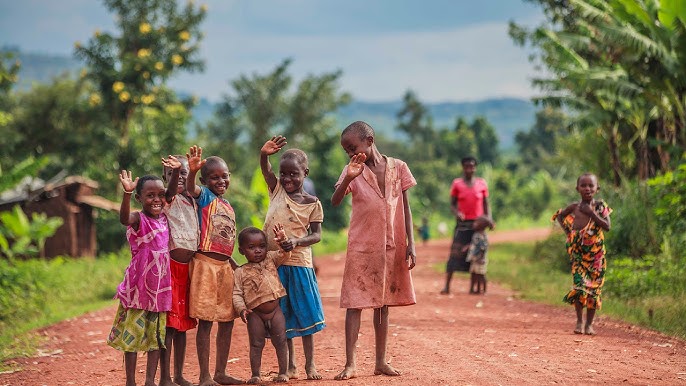
Buy Ugandan Crafts and Souvenirs Locally | Experiya Tour Company
October 29, 2025
How to Greet Locals in Luganda | Experiya Tour Company
October 29, 2025What Is Daily Life Like in a Ugandan Village?
In Uganda, the heartbeat of the nation still lies in its villages — where red-earth paths wind through banana plantations, where children’s laughter fills the air, and where each sunrise brings a rhythm of work, family, and community. While Uganda’s cities are rapidly modernizing, much of the country’s soul remains rooted in rural life. About 75% of Ugandans live in villages, and their daily routines offer a glimpse into traditions that have endured for generations.
For travelers seeking authentic cultural encounters, visiting a Ugandan village is one of the most rewarding experiences. It reveals the country’s warmth, simplicity, and unity — qualities that define the spirit of the Pearl of Africa. Life in a Ugandan village may seem modest by modern standards, but it is rich in connection, purpose, and humanity.
So, what is daily life really like in a Ugandan village? Let’s step away from the city lights and journey into the heart of rural Uganda, where time moves with the sun, and every day tells a story of hard work, family, and shared joy.
The Dawn of a New Day
Life in a Ugandan village begins early — often before sunrise. Roosters crow, goats bleat, and the first wisps of smoke rise from outdoor kitchens as women light their charcoal or firewood stoves. The cool morning air is filled with the scent of dew and the distant hum of insects awakening with the light.
In most villages, households rely on natural daylight for daily activities, so early mornings are crucial. Men and older boys head out to the gardens or fields, while women begin the day’s cooking, prepare breakfast, and fetch water from nearby wells or boreholes. Children quickly get ready for school, often walking several kilometers along dusty paths to reach their classrooms.
Breakfast in a Ugandan village is simple but hearty — perhaps a cup of tea sweetened with sugar and milk, accompanied by cassava, sweet potatoes, or chapati. For some families, porridge made from maize or millet flour provides the energy needed to start the day.
Agriculture – The Heartbeat of Village Life
Farming is the backbone of rural Uganda. Almost every family grows crops, either for household consumption or for small-scale trade in local markets. The country’s fertile soil and reliable rainfall make agriculture a way of life rather than an occupation.
The main crops vary by region but commonly include matoke (green bananas), maize, beans, cassava, groundnuts, millet, and coffee. Families often own small plots of land, which they cultivate manually using hoes and machetes. Cows, goats, and chickens roam freely, providing milk, eggs, and meat.
Farm work is a communal affair. Men usually handle tasks like clearing land and planting larger crops, while women manage weeding, harvesting, and post-harvest processing. During planting or harvest seasons, neighbors come together to help one another, turning labor into a social activity accompanied by songs, laughter, and shared meals.
Children are part of this rhythm from an early age. After school or on weekends, they help herd animals, fetch firewood, or carry harvests from the fields. This sense of contribution builds a deep respect for family and community — values that are central to village life.
The Role of Women in the Village
Women are the pillars of Ugandan village life. Their days are long and filled with multiple responsibilities — caring for children, cooking meals, tending to gardens, fetching water, and managing the home. Despite the demanding workload, women approach their duties with remarkable grace and strength.
In many villages, women also take part in income-generating activities such as basket weaving, craft making, or selling produce at the local market. Groups of women often form cooperatives or savings associations (known locally as “saccos”), which help them support each other financially and socially.
Beyond their economic contributions, women are also cultural custodians. They teach traditional songs, dances, and values to their children, ensuring that the community’s heritage endures.

Education – The Path to a Brighter Future
For children in Ugandan villages, education is highly valued. Parents may sacrifice much to send their children to school, believing it to be the key to a better future.
A typical school day starts early. Children, dressed in colorful uniforms, walk to school in groups, often carrying jerrycans of water or packed lunches in small tins. In rural areas, schools may be modest — sometimes with few classrooms, shared textbooks, and wooden benches. Yet the enthusiasm of students and teachers is unwavering.
Subjects like English, mathematics, and science are taught alongside social studies and physical education. For many children, school is not only a place of learning but also of social growth and hope. After classes, they return home to help with chores or play games like football, skipping rope, or tag in the open fields.
The Midday Hustle
As the sun climbs high, the village bustles with activity. Farmers return home for lunch, markets come alive with chatter, and the sound of bicycles and motorbikes hum along the dusty roads.
Lunch in a Ugandan village is a communal affair. Families often eat together, sitting on mats or simple benches. The meal typically includes staple foods such as matoke, beans, posho (maize meal), sweet potatoes, or cassava. In regions near lakes or rivers, fish is common, while in others, vegetables like dodo (amaranth greens) and pumpkin leaves add color and nutrition.
Food is prepared with care and shared generously. Guests are always welcome at the table — hospitality is a deeply ingrained value in Ugandan culture. Refusing food offered by a host is considered impolite, as meals are a symbol of friendship and gratitude.
The Market Scene – The Social Hub of the Village
No Ugandan village is complete without a market. It’s the heartbeat of community interaction and economic life. Markets are usually held once or twice a week, drawing vendors and buyers from surrounding areas.
Here, you’ll find everything — from fresh produce and grains to handmade crafts, clothes, and livestock. The air buzzes with energy as people bargain, laugh, and exchange stories. Children run errands for their parents, elders greet each other warmly, and music often plays from nearby stalls selling roasted meat or chapati.
For travelers, visiting a village market is an unforgettable experience. It’s a feast for the senses — the colors of fruits and fabrics, the aroma of local spices, and the genuine smiles of vendors proud of their trade.
The Evening Glow
As the sun sets behind the hills, the village slows down. Smoke curls from cooking fires once again as families prepare supper. Dinner often includes leftovers from lunch, accompanied by tea or local millet porridge.
Evenings are a time for storytelling, song, and rest. Elders gather under the shade of mango trees to share wisdom, while children listen wide-eyed to folktales about cunning hares, brave hunters, and talking animals. In some villages, traditional music and dance still form part of the evening entertainment, especially during weddings, harvests, or cultural ceremonies.
Without electricity in many rural areas, nights are lit by lanterns, candles, or the glow of the moon. The peaceful quiet of the countryside settles in, broken only by the distant sound of crickets or the rhythmic beat of a drum from a nearby gathering.
Faith and Community
Religion plays an important role in Ugandan village life. Most villages have at least one church or mosque, which serves as both a place of worship and a community center. Sundays are particularly special — families dress in their best clothes and attend church services filled with singing, dancing, and joyful praise.
Beyond religion, Ugandans place immense value on community. Neighbors help each other in times of need — whether it’s building a new house, harvesting crops, or supporting a family during illness. This spirit of togetherness, known locally as obuntu bulamu (a Luganda phrase meaning “humanity toward others”), is the foundation of village life.
Challenges of Village Life
While life in Ugandan villages is rich in community and simplicity, it is not without challenges. Access to clean water, healthcare, and electricity remains limited in many areas. Poor roads make transport difficult, especially during rainy seasons, and schools may lack sufficient resources.
However, resilience defines Uganda’s rural population. Despite these hardships, villagers find joy in the small things — a good harvest, a healthy child, or a shared song at the end of the day. Development programs and tourism initiatives have also begun to improve living standards, bringing opportunities for education, healthcare, and income generation to rural communities.
Why You Should Visit a Ugandan Village
For travelers, spending time in a Ugandan village offers an authentic window into the heart of the country. It’s a chance to experience the kindness and hospitality of Ugandan people, to learn traditional farming or cooking techniques, and to participate in daily activities like milking cows, pounding millet, or weaving baskets.
Unlike typical tourist attractions, a village visit allows you to slow down, connect, and appreciate life’s simplicity. You’ll see how communities live in harmony with nature, guided by respect, faith, and cooperation. Many visitors describe it as one of the most humbling and enriching experiences of their travels.
Why You Should Travel With Experiya Tour Company
To experience village life in Uganda authentically and respectfully, traveling with Experiya Tour Company is the best choice. Experiya specializes in immersive cultural tours that go beyond sightseeing — offering travelers the opportunity to live, learn, and engage with local communities.
Their village experiences allow you to spend a day or more in rural Uganda, joining families in their daily routines, learning how to cook traditional meals, visiting local schools, and even participating in craft-making workshops. Experiya’s expert guides ensure that every visit is conducted ethically and that your presence benefits the community through sustainable tourism partnerships.
Whether you want to experience the calm rhythm of village life, join in a community celebration, or simply share stories by the fire under a starry African sky, Experiya Tour Company makes it possible.
Book your cultural journey with Experiya Tour Company and discover Uganda from the heart — through its villages, its people, and its timeless traditions.




